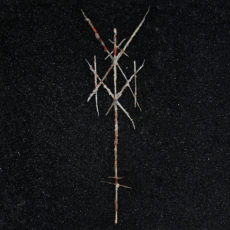Wiegedood - There’s Always Blood At The End Of The Road
15 Mar 2022 - Ajay
Black Metal | Century Media Records | Release date: 14 Jan 2022

It has been four years between Church of Ra-alumni Wiegedood’s Century Media label debut De Doden Hebben Het Goed III and the follow-up There’s Always Blood At The End Of The Road. With the De Doden Hebben Het Goed (trans.: “The Dead Are Doing Well”, or “The Dead Have It Good”) trilogy behind them, there is a noticeably different approach with album number 4.
Each of the preceding albums only contained four songs, with songs running between 6 to 13 minutes, whilst There’s Always Blood At The End Of The Road comes in at nine songs, with only one song over 6 minutes in length (mid album track “Now Will Always Be” which clocks in at 8 minutes and 16 seconds).
Is this perhaps Wiegedood’s Black Album moment? Shorter and somewhat more commercial songs with a bombastic production? The long and the short answer is no, this is not a critical sell-out for the band. It is a progression, though for some it may not be a welcome one. Whilst I liked the rawness of the trilogy, there is no denying that when the album opener “FN SCAR 16” kicks in that There’s Always Blood At The End Of The Road’s production adds to the ferocity of the music. The running times of the songs may be shorter, but with nine songs you get a longer album from the group. Individual tracks may not be as epic as the three previous albums, but the way the songs segue together, and the sequencing creates a new epic-ness. The first three tracks succinctly follow on from each other in a way that feels like one long track split into three chapters, and the album itself feeling like three movements (movement 1 = tracks 1 through 3, movement 2 = tracks 4 & 5, and movement 3 = tracks 7 through 9).
Drummer Wim Coppers, who is also the drummer of Oathbreaker (another part of the Church of Ra collective and whose 2016 release Rheia is bona fide “blackgaze” masterpiece), is a machine on this album. His frantic rhythms driving each song forward. The only respite he gets is the acoustic interlude “Wade” and the last minutes of “Nuages” which eschews rampant black metal in favour of a slow, almost post-metal cross djent end, before “Theft and Begging” throws us back into the maelstrom again. The twin guitar work of Gilles Demolder (also in Oathbreaker) and Levy Seynaeve is equally ferocious throughout, with the added bonus of Levy’s unique throat-singing bringing some vocal dynamics often missing within black metal, a genre that usually relies heavily on the tried and tested piercing screech.
I spent a lot of time with this record over the week and played it up against their previous album to give myself perspective of the change. I will admit to initially not liking it. I had begrudgingly become that fan that doesn’t want a band to change or progress to far, but repeat listens have made me love and appreciate this beast, and to look forward to the next chapter of their story.